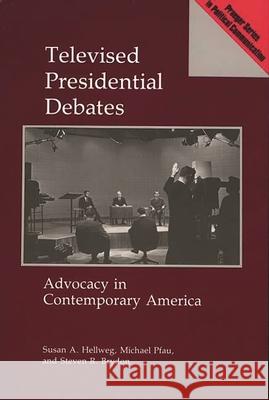Televised Presidential Debates: Advocacy in Contemporary America » książka
Televised Presidential Debates: Advocacy in Contemporary America
ISBN-13: 9780275936211 / Angielski / Twarda / 1991 / 192 str.
Televised debates between the nominees of the two major parties have become standard fare in contemporary presidential election campaigns. The authors of this important volume maintain that television has altered the very nature of presidential debates profoundly, that the demands of television have dictated the structure and formats of contemporary debates, and that the visual content of presidential debates plays an important role in the way that candidates exercise influence in televised debates. This important work employs a television perspective in examining the sponsorship, formats, nature, and impacts of presidential debates, stressing the 1960, 1976, 1980, 1984, and 1988 debates. The authors assert that in order to understand contemporary political debates, one must understand how television communicates and exercises influence in this context.
Hellweg, Pfau, and Brydon integrate contemporary theory and research about the television medium and influence with extensive research on presidential debates. Specific topics include how presidential debates have evolved as a function of the participation of the broadcast industry, how debates are structured to fit the demands of the television medium, how candidates' verbal messages must be tailored to the medium, how candidates' visual messages are defined through the medium, and the persuasive effects of mediated debates. Televised Presidential Debates will be particularly useful to scholars and students of political communication, campaigns and elections, and mass media.











